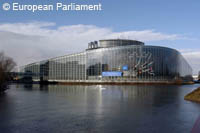ITRE committee begins FP7 vote, emphasising SMEs and autonomy for the ERC
The European Parliament's Industry, Research and Energy (ITRE) committee adopted a series of amendments on the Commission's proposal for the Seventh Framework Programme (FP7) on 15 May. Many of the changes are intended to increase the participation of small and medium sized enterprises (SMEs) in the programme, while others aim to give the European Research Council (ERC) further independence, or to specify particular scientific fields that should be included. In total, some 1,275 amendments had been submitted by members of the ITRE committee, and a further 232 had been put forward by seven other committees. Agreement between political groups meant these amendments were reduced to 66 compromise amendments. The report, drafted by Polish MEP and rapporteur for FP7 Jerzy Buzek, supports the Commission's proposal in principle and endorses the structure of FP7. The programme is built around four specific programmes: Cooperation, Ideas, People and Capacities. The report also supports the Commission's selection of nine thematic areas, although the committee would like to split the area of 'security and space' into two separate themes. The nine thematic areas are: - health; - food, agriculture and biotechnology; - information and communication technologies (ICT); - nanosciences, nanotechnologies, materials and new production technologies; - energy; - environment; - transport; - socio-economic sciences and the humanities; - security and space. The ITRE committee's amendments include a new energy target - transforming the current fossil-fuel based energy system into the most sustainable and energy efficient economy in the world by 2020. In the 'food, agriculture and biotechnology' section, MEPs also voted to specify areas such as fisheries stockbreeding, citizens' awareness, nutritional physiology, genetically modified organisms, bioinformatics, metagenomics (the study of biological diversity), genomic engineering, soil fertility, rational farming, evaluation of plant innovations and the rational management of water use. Amendments in the ICT section include the requirement: 'The priority will be considered to lie in reducing the digital divide.' Other changes refer to promoting accessibility and the transparency of governance. In health, MEPs included a revision, stipulating that research should also focus on neglected diseases, and that equal access to publicly funded research is ensured. Other amendments are intended to ensure that the following topics are not overlooked: immunotherapy, innovative medicines, electronic implants, therapeutic tools for regenerative and cell-based medicine, gene therapies, cellular therapies, progressive degenerative diseases, epilepsy, health ageing, fungal infections and respiratory diseases. Several amendments aim to increase the participation of SMEs in the EU's research programme. For example, compromise amendment nine states: 'In the event of SME specific instruments becoming oversubscribed, the funding of the various [framework programme] instruments will be reviewed with a view to directing funding towards those instruments in demand. The synergies between the Framework Programme and EUREKA can be harnessed to support partnering between large companies and SMEs.' MEPs also voted to include a paragraph stating that initiatives such as special calls for SMEs, national exploratory awards and support actions should be implemented throughout the Cooperation programme. On the European Research Council (ERC), the ITRE report tightens the Commission's proposed ERC legal framework. While the Commission suggested that the ERC should have a scientific council, supported by a dedicated implementation structure, the Parliament committee proposes that the ERC should be 'initially set up as an Executive Agency that will become an independent structure established under co-decision procedure [...]. It will consist of a scientific council and an administrative board. The scientific council will be supported by temporary scientific staff chosen by the scientific council members.' The Commission's proposal sees members of the scientific council appointed by the Commission. The committee's report asks that ERC management be carried out by staff either recruited for that purpose or seconded from the EU institutions. Their work will only cover 'the real administrative needs' of the Council, states one amendment. On Joint Technology Initiatives (JTIs), the adopted report adds more criteria for their selection for funding. There should be: a genuine societal need and commitment from industry; added value measured in terms of excellence and synergies obtained through cross-border cooperation; the capacity to encourage entrepreneurship; and agenda for the training of researchers involved, according to the ITRE report. The final vote on the FP7 proposals will take place on 30 May, after the ITRE committee discusses financing and ethical issues. The Parliament should then vote in during a plenary session in June.



